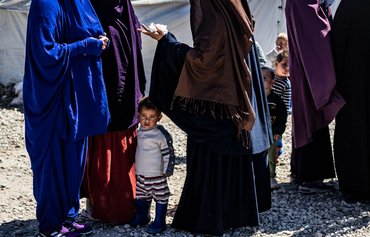As the self-proclaimed caliphate of the "Islamic State of Iraq and Syria" (ISIS) crumbles, Europe's governments are grappling with a shared problem: what to do with returning fighters and their families?
Governments have made no secret of their reluctance to take back nationals who went to fight in Iraq or Syria but now find themselves, as defeat nears, heading for home.
The prospect of taking back extremists poses obvious security risks on a continent that has suffered a wave of terror attacks in recent years.
Yet the situation also raises ethical dilemmas -- particularly whether to abandon the European wives and children of extremists to their fate.
![Members of the global coalition against the 'Islamic State of Iraq and Syria' gather at a conference in Kuwait City on March 15th, to discuss co-ordination to stem the flow of foreign fighters into Iraq and Syria. [Yasser al-Zayyat/AFP]](/cnmi_di/images/2017/11/01/10215-Anti-ISIS-coalition-600_384.jpg)
Members of the global coalition against the 'Islamic State of Iraq and Syria' gather at a conference in Kuwait City on March 15th, to discuss co-ordination to stem the flow of foreign fighters into Iraq and Syria. [Yasser al-Zayyat/AFP]
"Madam Chancellor, I want to come home with my family, help us," a woman identified as 31-year-old Nadja Ramadan, from Frankfurt, pleads in a video addressed to German leader Angela Merkel.
"I am not a terrorist," she insists in the video aired by Die Zeit newspaper, a baby in her arms.
Ramadan and her three children were detained in the former ISIS stronghold of al-Raqa, which was recaptured last month by the Syrian Democratic Forces (SDF). So far, Berlin has refused to assist her.
She is one of a growing number of Europeans issuing pleas for help from their governments -- either via the media or through their families.
Last week, around 20 families wrote to French President Emmanuel Macron urging him to bring their daughters home to face the courts.
"It is difficult to accept that our daughters, who did not fight, might be treated in the same way" as their husbands, they wrote.
They urged "France, a country of human rights", not to let the women face possible torture or death in Syria or Iraq.
'Kill them'
Of some 5,000 EU extremists believed to have gone to fight, around a third have already returned home, according to The Soufan Centre, a non-governmental organisation that conducts research on global security.
Some will have remained committed to violent extremism, it warned, adding: "It is clear that anyone who wishes to continue the fight will find a way to do so."
So far, France, Germany and Britain have tackled returnees on a case-by-case basis.
In Britain, where some 425 have returned, the goal is to "put them in court so they go to prison for a long time", said top anti-terrorism police officer Mark Rowley.
For those who cannot be put behind bars, he said, authorities will have to lean on surveillance and other "prevention measures" to keep the country safe.
But some in Britain openly tout a tougher line.
Joint Minister of State for the Department for International Development and Minister of State for the Foreign and Commonwealth Office Rory Stewart said last week that there was only one way to neutralise British ISIS fighters.
"These people are a serious danger to us," he told BBC radio. "Unfortunately the only way of dealing with them will be, in almost every case, to kill them."
Defence Minister Michael Fallon also said Britons fighting with ISIS were "a legitimate target".
Children as a threat
Raphaello Pantucci, International Security Studies director at the British think tank RUSI, said governments "have not been rushing" to claim responsibility for nationals captured by the SDF in al-Raqa and beyond.
Although fighters and their wives in most cases ended up in the war zone by choice, "we do have a duty of care to our citizens", he said.
"If they are showing up and we are able to put them through due process, that is what we should be doing."
The children of European extremists can hardly be blamed for their parents' decisions and beliefs, he added.
But in Germany at least, even these youngsters are being regarded as a security threat.
"We consider the return to Germany of jihadists' children, indoctrinated in a war zone, to be dangerous," German intelligence chief Hans-Georg Massen warned this month. "This could allow a new generation of jihadists to be raised here."
In France, which has seen some 300 of 1,700 nationals return, authorities have taken a firm stance in the face of pleas from their families to rescue loved ones being held in territory reclaimed from ISIS.
Defence Minister Florence Parly said Tuesday that French citizens detained in Iraq could be tried there.
In Syria, she added, French nationals being held by different groups were being flagged to the International Committee of the Red Cross.
Those who made it home would be held to account for their acts, she said.
"People returning to France know that they are exposing themselves to systematic legal proceedings."

![French President Francois Hollande delivers a speech to the crew during his visit on France's Charles de Gaulle aircraft carrier on December 4th, 2015 off the coast of Syria. Hollande gave his speech three weeks after he declared "war" on the 'Islamic State of Iraq and Syria' after attacks on Paris in which 130 were killed. [Philippe de Poulpiquet/POOL/AFP]](/cnmi_di/images/2017/11/01/10214-France-ISIS-fight-600_384.jpg)




